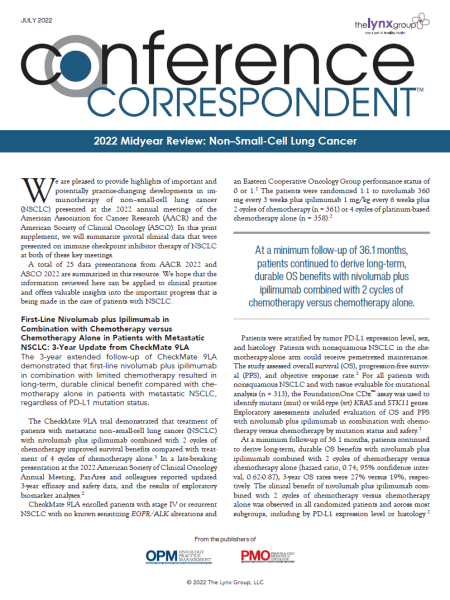Immune checkpoint inhibitor (ICI) pneumonitis is a lung immune-related adverse event that frequently necessitates ICI withdrawal. Whereas some cases of pneumonitis respond to corticosteroid therapy within the recommended 4 to 6 weeks, others do not improve or have several causes, necessitating prolonged or recurrent courses of steroids.1
Chronic rates of pneumonitis were measured in a study of 869 patients with non–small-cell lung cancer (NSCLC) who were started on ICIs at one institution between 2011 and 2019. Any pneumonitis requiring a total of ≥12 weeks of steroids, given either continuously or during numerous treatment courses, was defined as chronic pneumonitis.1 Of the 869 patients studied, 5.1% had ICI pneumonitis, and 50% of these patients had chronic pneumonitis. The median number of weeks on corticosteroid therapy for patients with chronic pneumonitis was 25.9 weeks (range, 12.4-114.4 weeks). Additional immunosuppressive medications, such as mycophenolate or infliximab (Remicade), were required in 4 patients.1
Other studies have shown that ICI pneumonitis is more common and severe in a real-world cancer cohort. Confounding diagnoses are frequently encountered when patients receiving ICI treatment experience worsening dyspnea or respiratory failure.2 Chronic pulmonary disorders such as interstitial lung disease, chronic obstructive pulmonary disease, and fibrosis on chest computed tomography imaging appear to enhance the risk for ICI pneumonitis and may be important contributors to the higher ICI pneumonitis burden in patients with lung cancer.2
In the study of 869 patients with NSCLC receiving ICI therapy, half of the patients who were identified with pneumonitis went on to develop chronic pneumonitis, which required ≥12 weeks of glucocorticoid medication. Some patients required a longer steroid course, whereas others first recovered and subsequently reappeared, even after the ICI was stopped. In the treatment of patients with ICI pneumonitis, it is critical to recognize chronic pneumonitis as a unique and prevalent clinical entity.1
Immune checkpoint pneumonitis that is steroid resistant is uncommon, yet it is linked with considerable morbidity and mortality.3 Additional immunomodulators can result in long-term improvement in more than one-third of patients. In the future, a better knowledge of the underlying biology of immune-related pneumonitis will be essential for developing more precise and effective treatment techniques.3 These findings call for more prospective trials and imply that patients with chronic lung illness who are receiving ICI therapy should undergo extra pretreatment or posttreatment testing.2
References
- Stuart J, Ricciuti B, Machado Alessi JV, et al. Chronic immune checkpoint inhibitor (ICI) pneumonitis in patients (pts) with non-small cell lung cancer (NSCLC). J Clin Oncol. 2021;39(suppl 15):Abstract 9103.
- Atchley WT, Alvarez C, Saxena-Beem S, et al. Immune checkpoint inhibitor-related pneumonitis in lung cancer: real-world incidence, risk factors, and management practices across six health care centers in North Carolina. Chest. 2021;160:731-742.
- Beattie J, Rizvi H, Fuentes P, et al. Success and failure of additional immune modulators in steroid-refractory/resistant pneumonitis related to immune checkpoint blockade. J Immunother Cancer. 2021;9:e001884.

